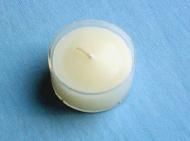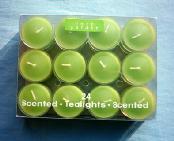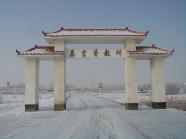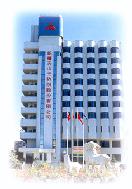Clearwisdom Collection: Special Collection - Exposing Slave Labor Practices Inside Chinese Labor Camps Part II
(Clearwisdom.net)
- Practitioners Forced to Make Candles in Toxic Working Conditions at Longshan Labor Camp in Shenyang City (Photos)
- My Slave Labor Experience at Tuanhe Prisoner Dispatch Center and Xin'an Forced Labor Camp in Beijing
- Practitioners Held in the Handan City First Detention Center in Hebei Province Forced to Package Contaminated "Sterile Chopsticks"
- Xinjiang Tianshan Wooltex Stock Corporation, Ltd. Joins Labor Camps and Prisons to Persecute Falun Gong Practitioners -- Bloody Slave Labor Behind Internationally Renowned Brand (Photos)
1. Practitioners Forced to Make Candles in Toxic Working Conditions at Longshan Labor Camp in Shenyang City (Photos)
(Clearwisdom.net) Since July 2001, Longshan Labor Camp officials have forced Falun Gong practitioners to make candles in various colors (other inmates are also forced to do the work). The candles are exported and the labor camp makes big profits from the cheap labor.
Longshan Labor Camp received its first order for the wax-processing job in mid July 2001. The elderly and weak Falun Gong practitioners were forced to make plastic packing boxes for the candles in their monitored rooms. The majority of Falun Gong practitioners were taken to a big hall near the entrance of the labor camp to process and to pack the candles. Over a dozen colors were used, and each of them gave off a strong smell of toxic chemicals. After a day's work, practitioners are covered with wax crumbs and their clothes smell like the chemicals. Many practitioners were pale, became dizzy and sick and lost their appetite from inhaling the fumes.
About 100 people are forced to do this work on a daily basis. The common inmates can finish 80 to 90 boxes per person per day if done at a fast speed.
The transparent glue used for sealing the box is toxic. Since one has to use the fingers to press and seal, practitioners' fingers often stick to the box. Sometimes this makes the skin peel off and stick on the box.
Initially, the daily work hours were from 7:00 or 8:00 a.m. to 5:00 p.m. But later on, the guards said that the containers were waiting to be filled for delivery. So sometimes the work hours were extended to past midnight or even around 1:00 a.m. or 2:00 a.m. Later, when there was not enough room in the big hall, they moved the production line to the narrow hallways between the monitored rooms. The monitored rooms were already poorly ventilated. Now, not only were the monitored rooms full of chemical odors, but the hallways as well. The long work hours and the toxic fumes made Falun Gong practitioners dizzy and weak all over. For example, a practitioner named Ning in the 1st brigade returned from the big hall and felt dizzy and weak. He lay on a bed and could not get up. Once, an elderly Falun Gong practitioner turned pale and had to be helped back from the wax-processing hall.
Apart from the slave labor products mentioned above, Longshan Labor Camp also assembles/manufactures holiday decorations such as snowmen and snow flakes, etc. In addition, they also make shoe soles and sew overcoats, etc. The work hours for these products are even longer and the labor is more intense.
2004-2-17
Chinese version available at http://minghui.org/mh/articles/2004/2/18/67818.html
2. My Slave Labor Experience at Tuanhe Prisoner Dispatch Center and Xin'an Forced Labor Camp in Beijing
By Chen Yin (a practitioner from Beijing, China)
(Clearwisdom.net) I was imprisoned between November 2000 and November 2001 for refusing to give up Falun Gong practice. During that period of time, I was held in servitude at the Tuanhe Prisoner Dispatch Center and the Xin'an Forced Labor Camp in Beijing.
Products Made
(1) Beijing Tuanhe Prisoner Dispatch Center
- Packaged large quantities of disposable chopsticks. Most of them are being used in restaurants and hotels while some are being exported.
- Made "Florance Gift Package" (1)
(2) Beijing Xin'an Labor Camp
- Packaged large quantities of disposable chopsticks. Most of them are being used in restaurants and hotels while some of them are being exported.
- Knit sweaters.
- Knit woolen gloves (60 Yuan per pair, exported to Europe.) (2)
- Crocheted cushions for tea set.
- Crocheted hats for a company at Qinghe Township, Beijing.
- Knit seat cushions.
- Re-processed sweaters; remove sundries from yarn.
- Made large quantities of slippers. The job was mainly gluing the sole and the instep together, and the labor camp demanded a high quality product. When I was there, it was the hottest time of the summer. Many practitioners and I were working in our prison cells. Working in a humid prison cell full of irritating glue odors was suffocating. We worked until midnight or one o'clock in the morning every time there was a shipment.
- Made stuffed animals such as rabbits, bears, dolphins, and penguins, etc. Major steps included putting the stuffing material inside, stitching the doll together, sewing the eyes, and stitching the mouth, etc.
The Sanitation and Living Conditions of the Forced Labor Camp
(1) Beijing Tuanhe Prisoner Dispatch Center
I was locked up with over a dozen Falun Gong practitioners in a cell that was about twelve square meters (130 square feet) in size. There were only eight bunk beds in the room; thus, some of us had to sleep on the floor. While we were sleeping, we had to keep our heads visible to the guards. We did everything in this cell including working, eating, drinking, and using the toilet; therefore, there were many flys and mosquitoes. At the dispatch center, we were only allowed to eat at certain times. Water was rationed; drinking water was limited. The prison guards never allowed us to wash our hands before meals. After a meal, we had to get back to work immediately. Twice a day, we were given five minutes for personal hygiene. When the time was up, we were forced to stop and drain the water. We were not allowed to take any water back to our cell. If we could not finish the work assigned to us, we were not allowed to clean ourselves. When there was a rush to get products out, we had to work late and go to sleep without washing. There were fixed times for the whole group of practitioners to go and use the toilet. Even then, we still had to ask for permission from the guards. We were allowed two minutes to use the toilet each time; thus, many people did not even have enough time to have a bowel movement. Those who had constipation could only have bowel movements several times a month. We could go to bed only at the specified time; otherwise, we would be scolded and not allowed to sleep. At night, the guards locked up all the cells; a small bucket in each cell was used for a toilet. We were watched even during sleep. Several times, I was woken up because I propped up my legs while I was sleeping. They thought I was doing Falun Gong exercises, so I had to keep my legs flat.
We were allowed very little sleep each day; we were forced to start working the moment we opened our eyes. My hands had blisters and thick calluses from working long hours to finish the assigned quota of packaging disposable chopsticks. I often worked until midnight. We were not allowed to sleep unless we finished the quota. We were forced to work over 16 hours every day, and everything was done in our cells. The sanitation condition was extremely poor. Even though we were packaging disposable chopsticks and the label said the chopsticks were disinfected at a high temperature, the entire process was unhygienic. We could not wash our hands, and we had to package those chopsticks that had fallen on the floor. In order to seek a huge profit, Tuanhe Prisoner Dispatch Center and Tuanhe Labor Camp disregarded the health of the general public and knowingly committed such wrongdoings. Many restaurants in Beijing are currently using these chopsticks. I heard they are even being exported.
Female practitioners are forced to perform excessive physical labor. We were forced to unload trucks full of bagged materials that weigh over 100 pounds each. We had to carry the bags on our shoulders from the truck to our cells. Other physical labors included digging pits, planting trees, and transporting fertilizers. The police exploited our labor to create illegal income for themselves. The dispatch center did not compensate us for any of our work. In fact, we were forced to do long and hard labor without any compensation.
(2) Beijing Xin'an Labor Camp
Both our bodies and minds were imprisoned and severely persecuted under the excessive workload. The police often kept us from sleeping at regular hours. When there were work orders, we had to work day and night to produce the best product with the shortest amount of time. The police even said, "You are trying to be good people, you should do the best under every circumstance."
All the work in the labor camp is labor intensive. Falun Gong practitioners are forced to work until midnight under dim lights, and everyone has a quota to meet. If a practitioner cannot finish the quota, he/she is not allowed to sleep. One time we were making gift items for Nestle; these items included knitted products and crocheted cushions. In order to meet the shipping deadline, we were forced to work in the hallway or lavatories until one or two o'clock in the morning; we sometimes worked through the whole night. The police used this method to control our thoughts. They would not let us have a single moment of idle time to think calmly, and we were not allowed to talk to each other. They had drug addicts and ex-practitioners monitoring us. They only wanted us to work.
In order to evade people's attention, the labor camp required us to sleep on time every night. We got up very early in the morning to work. During summer time, our cells were so hot that people sometimes collapsed from heat exhaustion. Many practitioners developed symptoms of hypertension and heart disease from overwork. Their entire bodies twitched.
(1) "Florance" is a manufacturer of cosmetic products in China.
(2) Yuan, Chinese currency, 500 Yuan is the average monthly income for an urban worker in China.
Chinese version available at http://minghui.org/mh/articles/2004/3/2/68993.html
3. Practitioners Held in the Handan City First Detention Center in Hebei Province Forced to Package Contaminated "Sterile Chopsticks"
(Clearwidsom.net) In early November 2002, many Falun Dafa practitioners in Handan City were arrested and sent to Handan City's First Detention Center. We were forced to work extremely hard, and we have suffered both physically and mentally.
Our major task was to package pairs of sterile chopsticks into sealed bags for use in a restaurant. However, the packing production was based in a contaminated environment--the prison cells. These cells are small, dark and humid, with the eating and lavatory facilities contained in the same place. A large cell is about 200 square feet, but approximately 20 and sometimes 30 people are squeezed in. A small cell is 100 square feet, but a dozen people are confined in this tight space. With a dozen gunnysacks of chopsticks (with 50-60 large bundles of chopsticks in one gunnysack and about 100 pairs per bundle) crowded into the cell, people could hardly move. Due to the time constraint, people had to continue working without washing their hands, even after they went to the toilet or wiped their nose. There were so many types of chopsticks; some would were small vendors and some were for big luxury restaurants. However, all the chopsticks were labeled "sterile chopsticks."
The workload was one gunnysack per day for two people, which was about 500-600 pairs. We had to start early in the morning and worked until 6:00 or 7:00 p.m. in order to finish the task. Lunchtime was very short and the food was poor, consisting of one steamed bun with a few unwashed vegetables cooked in boiling water. After the whole day's work, one would feel sore, with an aching back. The older people would feel even worse.
On January 16, 2003, the police guards brought us returned chopsticks that needed to be repacked. Once we opened the gunnysack, a foul odor came out of it, which made it hard for us to breathe. Those chopsticks had been packed, but due to the dirty and humid environment, they had become mildewed before they were shipped. Peeling off the moldy packaging made the conditions in the cell worse, as there were no sanitary equipment or procedures. Many people were allergic to it, with symptoms of rash on their face and body that was too itchy not to scratch, but they could not stop working. Thus, there were people scratching their skin while packaging the chopsticks. In addition, wrapping up those moldy, foul smelling chopsticks for use in a restaurant or by a small vendor was really harming others.
After the 2003 Chinese New Year, Handan City's First Detention Center added a new production line, that of wrapping fake flowers, resulting in an increased workload. To make a profit, police guards disregarded our physical abilities. The workload became two gunnysacks per day per person instead of one gunnysack for two people. As a result, we were so overloaded and tired after work that we could not even think straight. As soon as we had finished the chopsticks assignment, we started packing the fake flowers. Packing the flowers was more difficult than packing chopsticks and involved more steps. We cannot explain how difficult it is to pack those flowers. Perhaps using time as an example might explain the difficulty: We started work at 6:00 a.m. daily and worked until 11:00 p.m. or 12:00 am. Mealtime was short and there was no break after the meal. Additionally, every one of us had to be on guard duty for two hours after midnight. As a result, we only had two to three hours of actual sleep.
The flowers were put together with toxic glue that gave off an irritating smell, permeating the jail cell. The room was extremely stuffy. One person felt respiratory problems coming on and could hardly breathe. The work was so intense that we could not even take a one-day break. This kind of work continued until SARS started to spread. Due to the burden of the work, many practitioners' fingers were deformed and they had a hard time just bending them. Many practitioners experienced significant weight loss.
What is mentioned above is only a part of the abuse and mistreatment conducted under this persecution at the Handan City's First Detention Center. It is hard to describe in words the suffering from the forced, long hours and intense labor. Actually, many practitioners, one group after another, have been more brutally persecuted here since 1999. Practitioner Chen Yuqing died from the abuse, torment and mistreatment.
Handan City's First Detention Center phone number: 011-86-310-4042017 (reception desk).
March 3, 2004
Chinese version available at http://www.minghui.ca/mh/articles/2004/3/3/69078.html
4. Xinjiang Tianshan Wooltex Stock Corporation, Ltd. Joins Labor Camps and Prisons to Persecute Falun Gong Practitioners -- Bloody Slave Labor Behind Internationally Renowned Brand (Photos)
By a Dafa practitioner from Xinjiang Autonomous Region, China
(Clearwisdom.net)
Beginning in 1999, the Xinjiang Tianshan Wooltex Stock Corporation, Ltd. joined labor camps and prisons in Xinjiang Province to persecute Falun Gong practitioners.
The Labor Camp Bureau and Prison Administration in Mainland China assign financial goals to labor camps and prisons. In order to reach that goal and to make money for themselves, the authorities of these institutions conspire with corporations to exploit the detainees' labor.
After the persecution of Falun Gong in Mainland China began in July 1999, many Falun Gong practitioners in Xinjiang Province were sent to various labor camps and prisons. The authorities there collaborated with the Xinjiang Tianshan Wooltex Stock Corporation, LTD. and with the Changji Special Transformer Factory in Xinjiang to force Falun Gong practitioners do slave labor.
Xinjiang Tianshan Wooltex Stock Co., Ltd. (hereinafter referred to as "Tianshan Wooltex") is one of the first joint venture enterprises in China established after the regulations concerning Sino-foreign joint venture enterprises were published. Tianshan Wooltex is a joint venture woolen textile enterprise, with joint venture capital from four companies, namely Urumqi Woolen Textile Co., Hong Kong Tianshan Woolen Textile Co., Ltd. (Which consists of Hong Kong Peninsula Knitting Co., Ltd., Dongyang (Japan) Spinning Industry Co., Ltd.), Hong Kong International Cotton Industry Co., Ltd. and the Xinjiang Uygur Autonomous Region Supply and Market Cooperative.
Since 1990, Tianshan Wooltex has done business with various labor camps and prisons in Xinjiang Province in order to exploit the detainees' labor. They did so in order to lower costs and improve its ability to gain more of an international market share. Currently, the Wulabo Labor Camp, Xinjiang Women's Labor Camp, Changji Labor Camp, No. 3 Prison of Xinjiang Province and No. 5 Prison of Xinjiang Province all have workshops owned by Tianshan Wooltex in their backyards. The detainees at the above-mentioned locations are forced to work for Tianshan Wooltex and mass produce several types of cashmere sweaters. If one could observe how these sweaters are produced, one would recognize the cruel abuse the detainees are subjected to.
Falun Gong Practitioners Are Major Targets For Slave Labor
In August 2000, male Falun Gong practitioners being held at different labor camps in Xinjiang were sent to Division Six of the Changji Labor Camp. Division Six became the designated place for the persecution of Falun Gong practitioners. It is also the main location where products for Tianshan Wooltex are made and processed. Between the years 2000 and 2002, more than 50 Falun Gong practitioners were forced to work for Tianshan Wooltex in labor camp workshops.
When Tianshan Wooltex receives an order, it sends it over to the labor camps and prisons, at the same time providing them with raw materials. It also gives a deadline by which time Tianshan Wooltex will buy back the finished products at an extremely low price. In order to meet the deadline, the guards at the labor camps and prisons often coerce the detainees to work days on end with no sleep.
Many detainees at Division One of Changji Labor Camp in Xinjiang Province are routinely denied sleep several weeks out of the month. They work an average of more than 20 hours a day. They can only take a short nap after dawn on the platform where they make the sweaters. When they work on the machines, they often have to work for one day and one night at a time. Most of them have swollen legs from malnutrition and exhausting labor conditions. The workshop is only 200 meters (about 850 feet) from the cafeteria, but most detainees do not have time to eat breakfast. The guards often get a bucket of porridge -- lunch for the detainees. The guards treat the detainees as robots, and when they are too worn out to work, the guards would give them a whipping to force them to continue.
When seeing workers fall asleep, the guards shock them with electric batons and order the head of the workshop, also an inmate, to hit them with bricks and wooden clubs. If the detainee fails to complete his assigned work, the guard would cuff him to a heating pipe, strip him naked and shock his neck, armpits, abdomen, private areas, mouth and ears with electric batons, in addition to extending their detention term.
Jiang's annihilation policy against Falun Gong, "defame their reputations, bankrupt them financially and destroy them physically" allowed Tianshan Wooltex to provide space and financial support for labor camps and prisons that engage in the exploitation of detainees. They are especially malicious in torturing Falun Gong practitioners.
The guards from Division Six in the Changji Labor Camp force determined Dafa practitioners to do heavy manual labor, to build vegetable cellars in the day and knit sweaters all night long. Exhausted Dafa practitioners often fall asleep at night while knitting the sweaters, and the guards would then poke them with needles and scissors. Dafa practitioner Wang Jianping from Kelamayi has a handicapped left hand and is slow in knitting the sweaters, so the guards threw bricks on his chest and back. Sometimes when the practitioners make a mistake, the inspector would verbally abuse them and extort money from them. Tianshan Wooltex often forces detainees who have no source of income to pay for ruined sweaters, and the result would be that the detainee receives an extension to his term.
Tianshan Wooltex Sends Local Inspectors To Labor Camps And Prisons
Every time government inspectors come to the labor camp, the guards at Division Six fear Dafa practitioners may expose the truth, so they lock the practitioners in the basement or force them to work in the fields until the inspectors have left.
Tianshan Wooltex sends its own inspectors to each workshop at the Changji Labor Camp. These inspectors witness the atrocities of labor exploitation and torture on a daily basis, but they pretend they don't know. Na Ren is one such inspector who overlooks sweater production at Division Six.
People in charge at Tianshan Wooltex at various levels often visit the Changji Labor Camp and prisons. Prior to their visit, the labor camp would put up a banner that reads "Welcome xx to come and inspect." This is still ongoing.
Profits Made Off Slave Labor Are Used To Build More Facilities
When the labor camps and prisons receive large amounts of money from the sale of the sweaters abroad, they would build more office buildings, workshops and confinement rooms. They would also purchase electric batons, handcuffs, torture tools, televisions, and VCDs to reward guards who torture Falun Gong practitioners and recruit more guards to persecute determined Falun Gong practitioners.
Each Sweater Is Cursed at by the Inmates
Other than Falun Gong practitioners, ordinary detainees are also forced to do slave labor. Because of long-term overwork, lack of sleep, malnutrition, stress and lack of medical care, many detainees contracted tuberculosis, hepatitis, scabies, and asthma, among other ailments. However, sick detainees are still forced to work.
Because the detainees are not allowed to take a shower for very long periods of time, lice along with pus and blood from the detainees' body are sometimes rubbed off on the sweaters. Because the inmates loathe being treated as slaves, they intentionally wipe the filthiest things from their bodies and other places on the sweaters as a form of revenge. Because the sweaters are processed several times before they are sold, the dirty things and blood usually disappear after the final step.
After suffering all kinds of torture at Division Six in the Changji Labor Camp, a detainee said, "The first thing I'll do after I go home is to buy a Tianshan sweater and burn it on the spot!"
Here we want to call on all international boards of accreditation, foreign businesses and textile mills, weaving and knitting corporations to boycott the sweaters sold by Tianshan Wooltex, stained with the detainees' blood. Let's join efforts in ending the exploitation of Falun Gong practitioners by Tianshan Wooltex.
Since similar incidents are commonplace in prisons and labor camps all across Mainland China where Falun Gong practitioners are held, we call for Dafa practitioners in China and abroad to expose this crime and tell the world's people about Jiang's persecution of Falun Gong, and to help indirect persecutors to see their role in this crime, and to cut off the evildoers' financial resources.
Attached: reference material
Xinjiang Tianshan Wooltex Stock Corporation, Ltd. tries its best to cover up this crime. The "Tianshan" trademark was identified as a "famous Chinese brand" by the State Administration of Industry and Commerce. "Tianshan" products were awarded the State Quality Certificate of Exemption from Inspection in March 2002. Moreover, Tianshan Wooltex produces sweaters for brands of other well-known enterprises in the world, such as Banana Republic, Neiman Marcus, Holt Renfrew, Ports, Minimum, Bon Genie, Tutti Colori, Espina, Cream, Anivee F, Son June Wan, French Connection, and others. Orders from Banana Republic number between 200,000 and 280,000 pieces every year.
Dafa practitioners who are being illegally held at the Changji Labor Camp for slave labor include Guo Shuyan, Han Jinzhong, Gong Hailiang, Liu Anhong, Ge Lijun, among others.
Person in charge at Tianshan Wooltex:
Zhang Ziqiang, chairman and secretary of the Party Committee. He once held positions of: deputy head of Urumqi City Organization Department, deputy manager of Urumqi City Labor Service Company, head of Urumqi City Goods and Material Bureau.
Xinjiang Tianshan Wooltex Stock Co, Ltd.
Address: No.1 Yinchuan Road, Urumqi, Xinjiang, China
Post Code: 830054
Tel: 86-991-4311866-6834
Fax: 86-991-4310472
E-Mail: [email protected]
Xinjiang Tianshan Wooltex Hong Kong Office Ltd
Address: Block B&C, 9/F, 702 Castle Peak Road, Hop Hingind Bldg, Kowloon, Hong Kong
Tel: 852-27418591
Fax: 852-27860197
Changji Labor Camp in Xinjiang
Office: 86-994-5816156
Division One: 86-994-5816100
Division Six: 86-994-5816092
Division Five: 86-994-5816303
Watchdog Division: 86-994-5816389
Statistics Division: 86-994-5816276
Perpetrators at the Changji Labor Camp:
Zhu Xuefei: former political secretary of Changji Labor Camp, currently political secretary of the Wusu Labor Camp in Xinjiang
Li Jianjiang: currently political secretary of Changji Labor Camp
Wang Xiaofei: deputy head of the labor camp
Zhang Yan: deputy head of the Administration Section
Gu Jianhai: former instructor of Division Six, which specializes in the persecution of Falun Gong
Chen Jiang: current instructor of Division Six
Tian Hu: deputy head of Division Six
Ma Longyue: deputy head of Division Six
Wang Feng: instructor of Division Six
Wang Qi: instructor of Division Six
Ning Tao: instructor of Division One
Chinese version available at http://www.minghui.org/mh/articles/2004/3/9/69369.html










